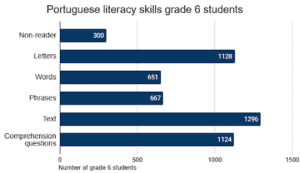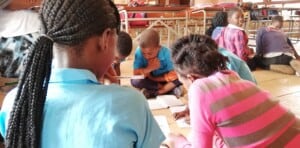The Potential of Targeted Instruction to Improve Learning Outcomes in Mozambique
November 8th, 2024 | Stories
Students read books and respond to comprehension questions.
Every learner enters the classroom with a unique set of strengths and obstacles to overcome. A one-size-fits-all approach in education does not account for these differences. Students can move from one grade to the next without a solid grasp on key foundational skills, unless educators are regularly assessing where they are at and tailoring instruction to each learner.
Targeted instruction (TI) is an evidence-based pedagogical approach that assesses and groups students by learning level rather than age or grade. TI allows teachers to focus on building foundational skills with appropriate lessons for a period of time each day.
In Mozambique, the USAID-funded SABER program is working to address learners’ needs by teaching students in their mother tongue, training teachers in social and emotional learning approaches, and piloting a contextualized TI approach among students grades 3-5 in primary schools with recorded low student performance.
A literacy assessment by the SABER team in early 2024 showed that 25 percent of the more than 5,000 students tested could read grade level text in Portuguese, 22 percent could read only letters, and 5% could not read at all. These numbers were similar in local languages as well. The greater percentage of low performing students (27%) than students with mid-level competencies (12%) emphasized the importance of foundational remediation to reach those who would otherwise fall further behind.

In coordination with the Ministry of Education and Human Development and District and Provincial Education staff, the SABER team trained teachers in a set of schools on the TI pedagogical approach and supported its use in classrooms over one month. The team conducted baseline assessments to create skill groups and organized alternating 1.5 hour literacy and mathematics sessions throughout the week.
At the end of the pilot, the SABER team conducted an endline assessment to evaluate how TI could be operationalized within the Mozambican education system. We found that more than 50 percent of the students who participated in the pilot progressed to the next literacy competency level. For example, students advanced from reading only letters to reading phrases. In mathematics, 30 percent of students progressed to the next competency level. A small number of students even progressed 2 levels within the pilot; 3% for literacy and 4% for mathematics. This is indicative of the potential of TI to address foundational learning gaps in primary school.
 Students from grades 3-5 practice number recognition up to 100.
Students from grades 3-5 practice number recognition up to 100.
The team will join Mozambique’s Ministry of Education and Human Development at the Teaching at the Right Level Conference on November 14 – 15th, 2024 in Nairobi, Kenya to share their experiences and learn from others.
World Education is also using the TI approach in Uganda under the USAID-funded Targeting the Learning Crisis activity to support the large percentage (up to 83%) of primary school-age learners who lack foundational learning skills.
World Education fosters enduring partnerships across regions and sectors to advance education outcomes for all. We offer education systems strengthening, program design and implementation, applied research and evaluation, capacity development, and policy development services.